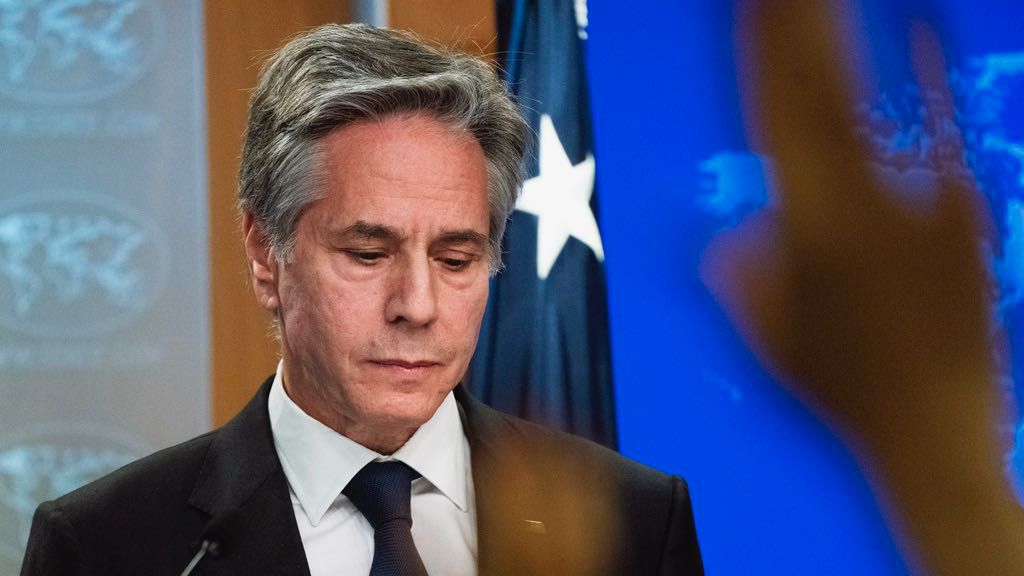When it's finished, a pier to provide aid shipments to Gaza could provide up to 2 million meals per day in relief to Palestinians seeking help during the Israel-Hamas war. However, whether or not the war continues is up to Hamas, Secretary of State Antony Blinken told reporters on Tuesday.
"There’s a very strong proposal on the table right now," Blinken said. "The question is, will Hamas take it? Does Hamas want to end the suffering that it provoked?"
Blinken’s comments came during a press conference in which he gave an overview of plans to build a temporary pier in Gaza, in order to continue humanitarian aid shipments.
Advocates for Palestinians in Gaza have, for weeks, declared that Gazans are suffering from malnutrition, lack of clean water and limited to no access to medicine.
That suffering, Blinken suggested, can be laid at the feet of Hamas. Gaza, he said, is in the throes of lawlessness, insecurity and desperation.
"When you put those things together, you have situations where aid goes in and then people immediately charge at the trucks," Blinken said, adding that it leads to looting, criminal gangs and then ordinary civilians fighting to get scraps.
"When you have a sustainable, predictable confident supply of assistance going in, that will give people confidence that food is there, it’ll keep coming, and they can rely on it," Blinken said.
Nongovernmental organizations and aid workers have insisted that the Israeli government is at the root of that scarcity. On March 7, Refugees International published a report indicating that Israeli policies have created "routine and arbitrary denial of legitimate humanitarian goods from entering Gaza."
Blinken impressed to reporters that the plan to build and import humanitarian aid to Gaza by emergency port is not the end-all, be-all of its aid to Palestinians in the Gaza strip.
"I want to emphasize, it is a complement, not a substitute for other ways of getting humanitarian assistance into Gaza — and in particular, overland routes remain the most critical way to get assistance in, and then to, the people who need it," Blinken told reporters Wednesday not long after a video conference with colleagues from Cyprus, the United Kingdom, the United Arab Emirates, Qatar, the European Union and the United Nations on the temporary pier project.
The pier, which is also being supported by Israel, Greece, Germany, Italy, the Netherlands and Canada, will "enable the distribution of up to 2 million meals every single day," Blinken said, as well as medicine, water and other supplies.
However, it’s unclear to some how the American government can both provide humanitarian aid to Gazans and weapons to Israel — the Washington Post reported last week that the U.S. has approved more than 100 separate weapons transfers to Israel under a provision allowing foreign military sales under a specific dollar amount.
When asked about those conflicting missions, Blinken asserted that America’s two objectives — to ensure that Israel can "effectively defend itself" and to ensure that civilians are protected and humanitarian assistance gets where it’s needed — are not in conflict…though he added that Israel must hold up its responsibilities.
"The question is, whether Israel, on the one hand, is and can effectively deal with its security needs and defending the country, while at the same time maximizing every possible effort to ensure that civilians are, are not harmed, and that assistance gets to those who need it," Blinken said.
To that end, the U.S. has not yet seen Israel’s plans for directing Gazans to safe zones ahead of an offensive in the area. Since the war between Israel and Hamas began in October, Israel has urged Palestinians to go to Rafah — in the south of the region — for their safety. Israel is reportedly planning to direct Gazans to "humanitarian islands" for their protection.
"The president's been very clear about this, repeatedly. What we said to Israel is this, given the large number of civilians that are now in Rafah, many of them displaced from other parts of Gaza, about 1.4 million, we need to see a plan that will get civilians out of harm's way," Blinken said.
"If there's to be a military operation in Rafah, and not only gets them out of harm's way, but also ensures that they have what they need, that they have shelter, that they have food, that they have medicine. We've not yet seen such a plan."



